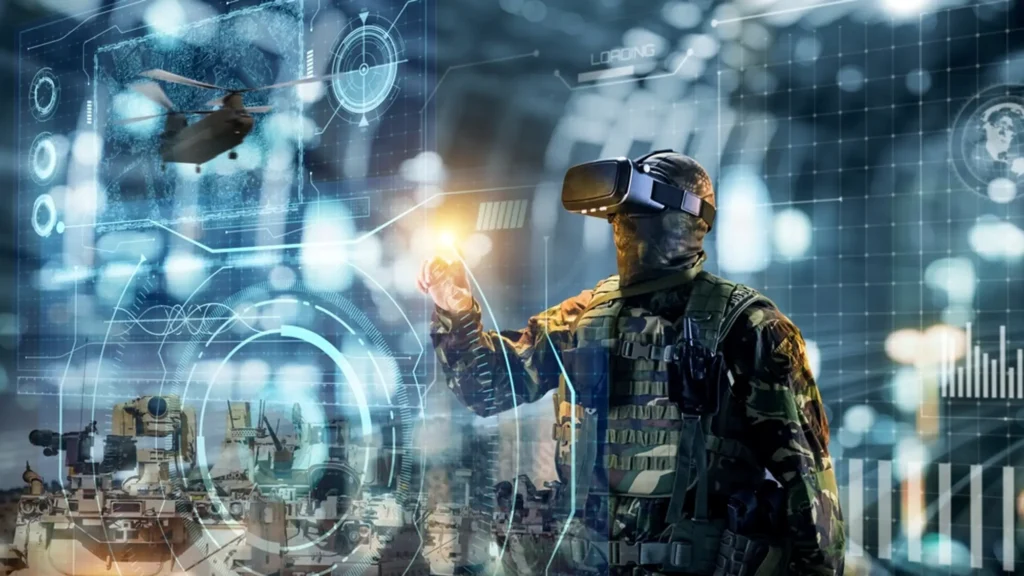AI on the Frontlines: Ethical Challenges and Global Ramifications
A new era is dawning in the realm of military operations, driven by unprecedented advancements in Artificial Intelligence technology. As AI continues to reshape our world, its transformative potential has found its way into the domain of warfare. Integrating artificial intelligence in military strategies and systems holds immense promise, offering enhanced capabilities, streamlined decision-making, and increased precision.
However, this evolution raises profound ethical concerns, cybersecurity vulnerabilities, and complex geopolitical implications. Moreover, with China making substantial strides in establishing pilot zones for AI development, the global landscape of AI-enhanced warfare is undergoing significant shifts. In this blog, we will explore the far-reaching consequences of this technology, delving into its ethical dimensions, China’s initiatives, and the broader implications for international security.
As we navigate this complex and rapidly evolving landscape, it becomes essential to understand the multifaceted impacts of artificial intelligence in warfare and strive towards responsible implementation in the pursuit of a secure and ethical future.
The Rise of AI in Warfare
Artificial Intelligence’s Role in Modern Warfare:
Artificial intelligence technologies are being increasingly integrated into military systems and strategies. From autonomous drones to intelligent surveillance systems, this offers enhanced capabilities in areas such as target recognition, decision-making, and strategic planning.
The Potential Benefits of AI in Warfare:
This can bring numerous advantages to military operations, including increased efficiency, reduced human error, improved situational awareness, and enhanced precision in targeting. These capabilities have the potential to shape the future of warfare.
Consequences of AI in Warfare
Ethical Considerations:
The use of artificial intelligence in warfare raises significant ethical concerns. Issues such as autonomous weapons, civilian safety, and the potential for unintended consequences pose challenges that must be carefully addressed. Striking the right balance between human control and independent decision-making is crucial to avoid ethical dilemmas.
Cybersecurity and Vulnerabilities:
AI-powered systems are not immune to cybersecurity threats. Integrating this technology in warfare introduces new vulnerabilities that adversaries can exploit, potentially leading to disruptive cyber-attacks or unauthorized control over autonomous systems. Ensuring robust cybersecurity measures becomes paramount.

China’s Pilot Zones for AI Development
China’s Ambitions:
China has established pilot zones for research, development, and implementation. These initiatives reflect China’s commitment to harnessing AI’s potential in various domains, including defense and warfare. China’s advancements in this technology present new challenges and opportunities on the global stage.
Implications for International Security:
China’s investment in this technology for warfare raises concerns among other nations regarding the strategic balance and potential arms races. The development of advanced AI-enabled weapons systems and China’s evolving military capabilities has the potential to reshape international security dynamics.
Far-Reaching Impacts of AI on Warfare
Changing Battlefield Dynamics:
It can potentially reshape the nature of warfare and the dynamics on the battlefield. The integration of AI-powered systems could lead to faster decision-making, increased precision, and altered tactics. This transformation may necessitate changes in military doctrines and strategies.
Socioeconomic Implications:
The widespread adoption of this technology in warfare may have significant socioeconomic impacts. From job displacement to shifts in the defense industry, AI-powered systems can have far-reaching consequences on employment, economic sectors, and national security priorities.
Conclusion:
As we embrace an AI-enhanced future, it is imperative to understand the consequences and implications of Artificial Intelligence in warfare. Integrating this technology brings benefits and challenges, including ethical considerations, cybersecurity vulnerabilities, and the reshaping of international security dynamics. The existence of China’s pilot zones for this development adds a new dimension to this evolving landscape. As AI continues to advance, it is essential for policymakers, military strategists, and society at large to navigate these complexities responsibly, ensuring that the development and use of artificial intelligence in warfare align with ethical frameworks, international norms, and the preservation of human values. For more insightful blogs, visit auxin.io






